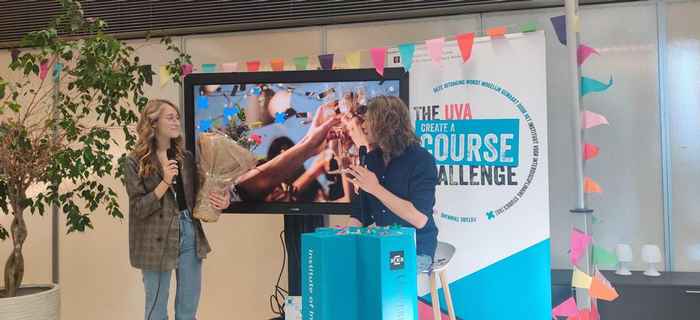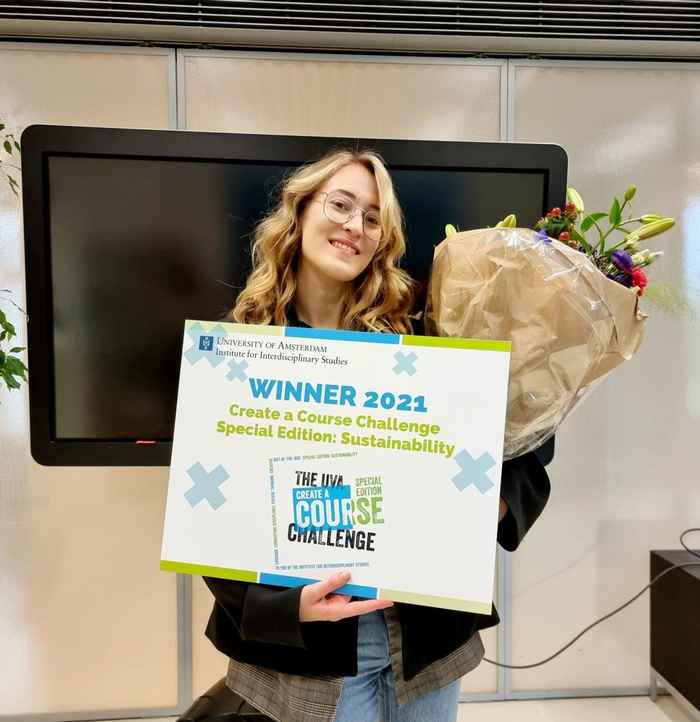Food, Animals and the Environment wins special Sustainability edition of UvA Create a Course Challenge
24 May 2021

The jury, consisting of Rick van der Ploeg, professor of Environmental Economics at the UvA and Oxford University, Lucy Wenting, director of the Institute for Interdisciplinary Studies (IIS), and Rosa van der Laag, student Future Planet Studies and co-plaintiff in the climate case against Shell, had a difficult decision to make. The five ideas for a new, interdisciplinary elective course at the UvA all appealed because of their societal relevance and the different perspectives on sustainability. However, the jury decided that Caatje's course is the most accessible to a broad audience.
Rosa, one of the jury members, explains: "It is an introductory course, which also appeals to students who may not initially be interested in sustainability. It also looks at environmental issues from various disciplines, such as ethics, media studies, environmental studies, political science and many more. The way we treat food, animals and nature are important topics that have not been linked together in a course before. Therefore, Food, Animals and the Environment is a valuable addition to the UvA course catalogue."

The content of the course
Caatje is involved in Human-Animal Studies as a student assistant and also co-founder of the Centre for Human-Animal Studies. Her idea for a new course at UvA was inspired by the work of Jeff Sebo and similar courses at prestigious universities abroad. The main effects of the Western food system on the environment, non-human animals, ecosystems, global health and future human societies are critically examined in the course.
Caatje explains: "Many climate problems are intertwined with our food system and the way we think about nature. Therefore, central to the course is the question: How does our relationship with animals and nature affect the climate crisis, and how do the climate crisis and our food system affect animals and nature?
The first part of the course dives deeper into food systems. What is a food system, and what impact does it have on humans, animals and ecosystems? In part two of the course, the ethical questions connected to the topic are asked. The image portrayed by the media and the way large organisations influence our food systems will be examined.
Students will learn about nature, in nature. By taking lectures in nature, students will be able to see the effects of our food systems on ecosystems and will be encouraged to consider their own relationship with nature."
The Create a Course Challenge Special Edition: Sustainability
This spring, the Institute for Interdisciplinary Studies (IIS) hosted a special edition of the annual Create a Course Challenge, with a focus on sustainability. As such, one of the judges' main criteria was how the course can contribute to the sustainable changes society needs.
Students were challenged to step out of the box and think about how sustainability education can be fun, challenging and meaningful. For this special edition, 36 ideas were submitted by UvA students from all faculties. Then all UvA students and staff could vote online on 10 ideas. The five ideas with the most votes had the chance to pitch their idea to the jury and the audience during a hybrid live finale event.
The grand finale
The five finalists were invited to present their idea on location at the IIS in front of the camera to the jury and audience, who attended the grand finale through a Zoom live stream. Jim Groot, Future Planet Studies lecturer and co-founder of Green City Watch, hosted the evening.
Caatje kicked off the evening with her strong pitch for 'Food, Animals and the Environment', after which Emilia Berenyi took over with her plea for the course 'From Local to Global: Take Action for the Climate' and Daphne Jonkers Both, Sabine Gorter and Muamer Hajtic presented their idea 'Sustainable Care in Healthcare'. Mira Toliou Zoomed in from Greece to pitch her idea for 'Sustainability Deconstructed: Inequalities and Solutions' and the evening was concluded by an passionate pitch for 'Critical Animal Studies: Multi-Species Oppression in the Anthropocene' by Tim Reysoo.
In the coming months, curriculum developers of the IIS will work with Caatje Kluskens to further develop her idea into an actual course, which will be offered as an interdisciplinary elective to UvA students from all faculties in the second semester of next academic year.
Student engagement
In the fall of 2021, the regular Create a Course Challenge will take place again, challenging all students to submit an idea for a new course at the UvA. The winning course idea will be further developed into a UvA-wide elective course by the student, together with curriculum developers of the IIS. As such, students can play an active role in influencing the way education is implemented and education at the UvA remains relevant and innovative.